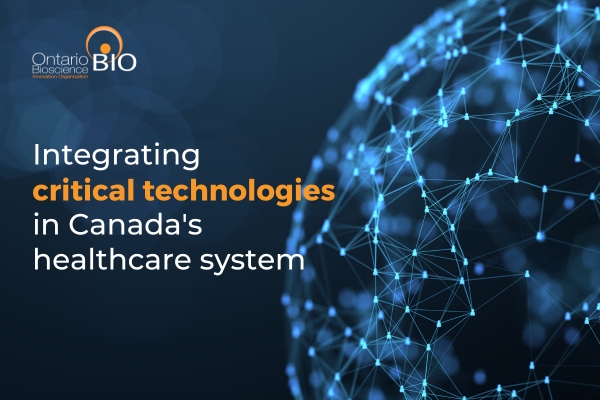Canada’s healthcare system is renowned for its commitment to providing universal access to medical services. However, as the demands on healthcare systems increase and medical complexities evolve, the integration of critical technologies becomes indispensable. Start-ups are playing a pivotal role in driving change by leveraging critical technologies like ethical Artificial Intelligence (AI), Blockchain, Cybersecurity, Robotics, 5G and Quantum Computing. These technologies have the potential to revolutionize healthcare, making it more efficient, accessible and effective.
In a bid to address the longstanding technology development and commercialization challenges that hinder the growth of small and medium-sized enterprises (SMEs) in the health science sector, the Ontario Bioscience Innovation Organization (OBIO®) has launched the Life Sciences Critical Technologies & Commercialization (LSCTC) Centre of Excellence. With up to $9.7 million funding support from the Government of Ontario, OBIO® will catalyze Ontario start-ups in commercializing and adopting critical technologies that revolutionize healthcare in Canada.
Ventures participating in the LSCTC Centre of Excellence will have access to technical & commercialization support through OBIO® and its delivery partners. Ventures will also have access to over 65 healthcare organizations and health systems that are part of OBIO® Early Adopter Health Network (EAHNTM). Adoption of critical technologies in the healthcare system will improve the delivery of care by reducing the impact of staffing shortages, increasing efficiencies in clinical workflows, decreasing the cost of care delivery, and improving patient and provider engagement.
This is how critical technologies are currently impacting the healthcare system:
AI:
Ethical AI is reshaping the healthcare landscape by demonstrating its remarkable capacity to analyze extensive volumes of medical data swiftly and precisely. Start-ups are developing AI-powered solutions for tasks like medical imaging, predictive analytics and personalized treatment plans. In Ontario, AI-driven applications are assisting physicians in diagnosing diseases, predicting patient outcomes and even managing patient schedules, making healthcare more efficient and patient-centred.
Blockchain:
The decentralized and tamper-resistant ledger technology behind blockchain is significantly impacting the security and management of patient data. In a country with a strong commitment to patient privacy, blockchain ensures that health records are securely stored and accessible to authorized personnel only. It reduces the risk of data breaches and allows patients to have more control over their health information.
Cybersecurity:
Cybersecurity is paramount in healthcare due to the sensitivity of patient information. Start-ups are developing advanced cybersecurity solutions to protect medical data, healthcare systems and Internet of Things (IoT) devices used in healthcare. Cybersecurity technologies, including advanced threat detection and encryption, are essential to safeguard patient information and maintain the integrity of healthcare systems.
Robotics:
Incorporating robotics into healthcare has the potential to enhance patient care and automate repetitive tasks. Start-ups in Ontario are developing robotic devices for surgical procedures, patient rehabilitation, patient transfer and even medication dispensing.
5G:
The rollout of 5G networks is expanding connectivity in Ontario, particularly in remote and underserved areas. Start-ups are harnessing the speed and reliability of 5G for telemedicine, enabling high-definition video consultations and remote patient monitoring. This technology will also support the growth of IoT in healthcare, allowing real-time data transmission from wearable devices and sensors. Patients living in rural Ontario regions can now access remote healthcare services by enabling providers to monitor vital signs, which improves early detection and treatment.
Quantum Computing:
Quantum computing has the potential to revolutionize drug discovery in Canadian healthcare. Its unparalleled processing power can analyze complex molecular interactions and simulate drug effects in ways that classical computers cannot. This promises faster and more efficient drug development, reducing the time and costs associated with bringing new medications to market.
While the commercialization and adoption of these technologies promise to transform Canadian healthcare, there are significant challenges to consider. Ensuring data privacy, regulatory compliance and integration into existing healthcare systems are some of the primary hurdles. Start-ups must also focus on user-friendliness and accessibility, ensuring these technologies are readily available and usable for both healthcare professionals and patients. Furthermore, ethical concerns surrounding AI and privacy issues in blockchain need to be addressed to build trust within the healthcare sector. Lastly, the cost of implementing these technologies can be a barrier, particularly for smaller healthcare providers and organizations.
Since 2009, OBIO® has engaged in strategy, programming, policy development and advocacy to further the commercialization of human health technologies that position Canada as a leader in the international marketplace. Through the LSCTC Centre, OBIO® and its delivery partners will catalyze a globally competitive collaborative ecosystem by leveraging and building on Ontario’s expertise and capabilities. If you are part of a healthcare organization and interested in joining OBIO’s Early Adopter Health Network (EAHN™) to evaluate, adopt and showcase innovative, value-producing Canadian health technologies, please submit an expression of interest.


